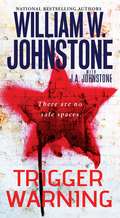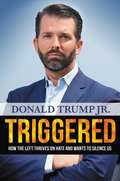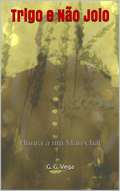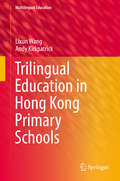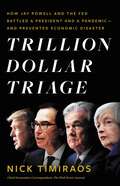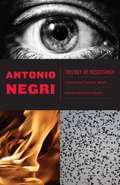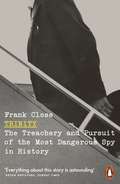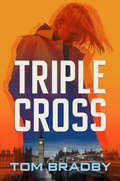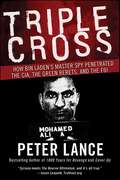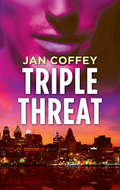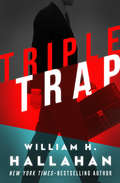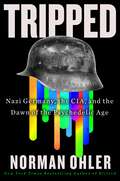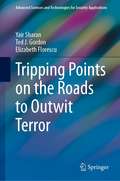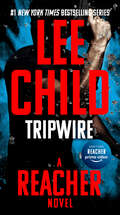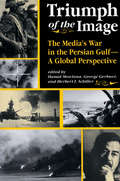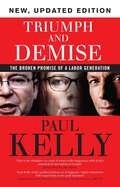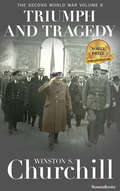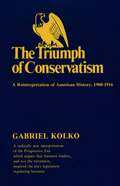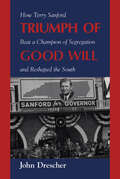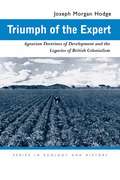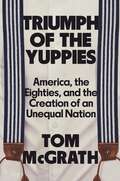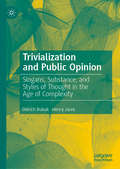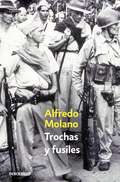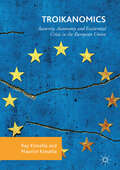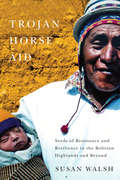- Table View
- List View
Trigger Warning
by William W. Johnstone J. A. JohnstoneJOHNSTONE COUNTRY. WHERE OTHERS FEAR TO TREAD.From the bestselling authors of The Doomsday Bunker, Black Friday, and Stand Your Ground comes the explosive story of a college under siege—and freedom under fire . . . POLITICAL CORRECTNESS WON’T SAVE YOU Former Army Ranger Jake Rivers is not your typical Kelton College student. He is not spoiled, coddled, or ultra-lib like his classmates who sneer at the “soldier boy.” Rivers is not “triggered” by “microaggressions.” He is not outraged by “male privilege” and “cisgender bathrooms.” He does not need a “safe space.” Or coloring books. Jake needs an education. And when terror strikes, the school needs Jake . . . Without warning, the sounds of gunfire plunge the campus into a battle zone. A violent gang of marauders invade the main hall, taking students as hostages for big ransom money. As a veteran and patriot, Jake won’t give in to their demands. But to fight back, he needs to enlist his fellow classmates to school these special snowflakes in the not-so-liberal art of war. This time, the aggression isn’t “micro.” It’s life or death. And only the strong survive . . . Live Free. Read Hard.
Triggered: How the Left Thrives on Hate and Wants to Silence Us
by Donald Trump Jr.<P><P>Donald Trump, Jr., exposes all the tricks that the left uses to smear conservatives and push them out of the public square, from online "shadow banning" to rampant "political correctness."In Triggered, Donald Trump, Jr. will expose all the tricks that the left uses to smear conservatives and push them out of the public square, from online "shadow banning" to fake accusations of "hate speech." <P><P>No topic is spared from political correctness. Trump, Jr. will write about the importance of fighting back and standing up for what you believe in. <P><P>From his childhood summers in Communist Czechoslovakia that began his political thought process, to working on construction sites with his father, to the major achievements of President Trump's administration, Donald Trump, Jr. spares no details and delivers a book that focuses on success and perseverance, and proves offense is the best defense. <P><P><b>A New York Times Bestseller</b>
Trigo e não Joio
by G. G. VegaAs Pessoas, nascemos em um mundo, manchados desde o começo com sangue. Tanto sangue foi derramado, com tanta violência em tantas guerras que é inevitável entender que está em nosso gene. Somos todos sobreviventes de uma forma ou de outra de guerras cruéis. Neste livro, expresso meu sentimento em relação a essa realidade, a realidade do espírito guerreiro que cobre o planeta com nuvens negras. Se fala de paz, de ciência, dos avanços da tecnología e da educação, mas a sombra da horrenda nuvem de guerra está sempre à espreita sobre todas as nações. A única luz para a vida é a pura luz das Sagradas Escrituras, quando você a conhece bem, sem ignorar a violência humana, quando entende que Deus tem um plano. A República do Paraguai, meu país de nascimento, nasceu e se estabeleceu em uma das épocas mais difíceis da história de toda a América.
Trilingual Education in Hong Kong Primary Schools (Multilingual Education #33)
by Andy Kirkpatrick Lixun WangThis book focuses on Hong Kong as a multilingual society. It investigates how trilingual education is implemented in Hong Kong primary schools. Based on a large scale survey of 155 Hong Kong schools and in-depth case studies in 3 selected schools, the book gives an overview of trilingual education in Hong Kong primary schools, revealing the views on trilingual education of all stakeholders: school principals, panel chairs, subject teachers, students, and parents. The research findings presented in this book suggest that the implementation of trilingual education varies significantly from school to school, as does the effectiveness of the trilingual education models used. It shows how students’ views towards the use of different media of instruction (MoIs) also vary, and how their mother-tongue backgrounds affect their perceptions. By documenting views, policies and implementation methods, the book provides insight into the practice of trilingual education in Hong Kong and offers suggestions on potentially effective implementation methods.
Trillion Dollar Triage: How Jay Powell and the Fed Battled a President and a Pandemic---and Prevented Economic Disaster
by Nick TimiraosThe inside story, told with &“insight, perspective, and stellar reporting,&” of how an unassuming civil servant created trillions of dollars from thin air, combatted a public health crisis, and saved the American economy from a second Great Depression (Alan S. Blinder, former Vice Chair of the Federal Reserve).By February 2020, the U.S. economic expansion had become the longest on record. Unemployment was plumbing half-century lows. Stock markets soared to new highs. One month later, the public health battle against a deadly virus had pushed the economy into the equivalent of a medically induced coma. America&’s workplaces—offices, shops, malls, and factories—shuttered. Many of the nation&’s largest employers and tens of thousands of small businesses faced ruin. Over 22 million American jobs were lost. The extreme uncertainty led to some of the largest daily drops ever in the stock market.Nick Timiraos, the Wall Street Journal&’s chief economics correspondent, draws on extensive interviews to detail the tense meetings, late night phone calls, and crucial video conferences behind the largest, swiftest U.S. economic policy response since World War II. Trillion Dollar Triage goes inside the Federal Reserve, one of the country&’s most important and least understood institutions, to chronicle how its plainspoken chairman, Jay Powell, unleashed an unprecedented monetary barrage to keep the economy on life support. With the bleeding stemmed, the Fed faced a new challenge: How to nurture a recovery without unleashing an inflation-fueling, bubble-blowing money bomb?Trillion Dollar Triage is the definitive, gripping history of a creative and unprecedented battle to shield the American economy from the twin threats of a public health disaster and economic crisis. Economic theory and policy will never be the same.
Trilogy of Resistance
by Antonio NegriWith Trilogy of Resistance, the political philosopher Antonio Negri extends his intervention in contemporary politics and culture into a new medium: drama. The three plays collected for the first time in this volume dramatize the central concepts of the innovative and influential thought he has articulated in his best-selling books Empire and Multitude, coauthored with Michael Hardt. In the tradition of Bertolt Brecht and Heiner Müller, Negri&’s political dramas are designed to provoke debate around the fundamental questions they raise about resistance, violence, and tyranny. In Swarm, the protagonist searches for an effective mode of activism; with the help of a Greek-style chorus, she tries on different roles, from the suicide bomber and party apparatchik to the multitude. The Bent Man, set in fascist Italy, focuses on a woodcutter who resists fascism by bending himself in two and using his own now-twisted body as a weapon against war. In Cithaeron, perhaps the most audacious of the three plays, Negri reworks Euripides&’s Bacchae to explore the circumstances that would compel a diverse and creative community to withdraw from both the despotic government that constrains it and the traditional family relationships that reinforce that despotism.First published in France in 2009 and featuring an introduction by Negri, Trilogy of Resistance provides a direct and passionate distillation of Negri&’s concepts and offers insights into one of the most important projects in political philosophy currently under way, as well as a timely reminder of the power of theater to effectively dramatize complex and challenging ideas.
Trinity: The Treachery and Pursuit of the Most Dangerous Spy in History
by Frank Close'Everything about this story is astounding' Bryan Appleyard, Sunday Times"Trinity" was the codename for the test explosion of the atomic bomb in New Mexico on 16 July 1945. Trinity is now also the extraordinary story of the bomb's metaphorical father, Rudolf Peierls; his intellectual son, the atomic spy, Klaus Fuchs, and the ghosts of the security services in Britain, the USA and USSR.Against the background of pre-war Nazi Germany, the Second World War and the following Cold War, the book traces how Peierls brought Fuchs into his family and his laboratory, only to be betrayed. It describes in unprecedented detail how Fuchs became a spy, his motivations and the information he passed to his Soviet contacts, both in the UK and after he went with Peierls to join the Manhattan Project at Los Alamos in 1944. Frank Close is himself a distinguished nuclear physicist: uniquely, the book explains the science as well as the spying.Fuchs returned to Britain in August 1946 still undetected and became central to the UK's independent effort to develop nuclear weapons. Close describes the febrile atmosphere at Harwell, the nuclear physics laboratory near Oxford, where many of the key players were quartered, and the charged relationships which developed there. He uncovers fresh evidence about the role of the crucial VENONA signals decryptions, and shows how, despite mistakes made by both MI5 and the FBI, the net gradually closed around Fuchs, building an intolerable pressure which finally cracked him.The Soviet Union exploded its first nuclear device in August 1949, far earlier than the US or UK expected. In 1951, the US Congressional Committee on Atomic Espionage concluded, 'Fuchs alone has influenced the safety of more people and accomplished greater damage than any other spy not only in the history of the United States, but in the history of nations'. This book is the most comprehensive account yet published of these events, and of the tragic figure at their centre.
Triple Cross (The Kate Henderson Thrillers #3)
by Tom BradbyFormer MI6 agent Kate Henderson returns in the series for &“fans of cerebral spycraft in the vein of le Carré&” from the international bestselling author (Publishers Weekly). Attempting to rebuild her shattered life on vacation in the South of France, former MI6 operative Kate Henderson receives an unexpected and most unwelcome visit from an old adversary: the UK Prime Minister. He has an extraordinary story to tell—and he needs her help. A Russian agent has come forward with news that the PM has been the victim of the greatest misinformation play in the history of MI6. It&’s run out of a special KGB unit that exists for one purpose alone: to process the intelligence from &“Agent Dante,&” a mole right at the heart of MI6 in London. Against her better judgement, Kate is forced back into the fray in a top-secret, deeply flawed and dangerous investigation. But now she&’s damaged goods. Her one-time allies no longer trust her. And neither do her enemies. Praise for Double Agent &“Bradby masterfully combines textured psychological drama with a rip-roaring plot that boasts several dizzying switchbacks along the way to a genuinely shocking conclusion.&” —Booklist (starred review) &“An enjoyably labyrinthine tale with a light touch and the odd naughty satirical echo.&” —Sunday Express (UK) &“The character of Kate is just terrific. She&’s honest, brave and whip smart. First and foremost, Kate wants to do the right thing, but in the murky world of 21st-century espionage it is not always clear what that is. If any of you are missing the Cold War espionage novels of the 1970s and 1980s, this series is for you.&” —Deadly Pleasures
Triple Cross: How bin Laden's Master Spy Penetrated the CIA, the Green Berets, and the FBI
by Peter Lance"A chilling account of a killer who slipped through the hands of a daft justice system….Triple Cross chronicles one of the most vicious spies of our time."—Toronto SunIn the years prior to 2001, no single agent of al Qaeda was more successful in compromising the U.S. intelligence community than Ali Mohamed. For almost two decades the former Egyptian army commando succeeded in living a double life—marrying an American woman, becoming a naturalized citizen, and infiltrating the CIA in Europe, the Green Berets at Fort Bragg, and the FBI in California—even as he helped orchestrate the campaign of terror that culminated in the 9/11 attacks.Triple Cross is award-winning investigative reporter Peter Lance's chilling true account of the career of the master spy known to his al Qaeda brothers as "Ali the American"—an explosive narrative revealing the gaping holes in our nation's security net. Finally, coming off his previous FBI exposé, Cover Up, Lance also chronicles the collapse of the Brooklyn murder trial of former FBI agent Lin DeVecchio, a case that could well have revolutionized public understanding of the background of 9/11.
Triple Threat
by Jan CoffeyCountdown to the Fourth of July… Just weeks before Independence Day, the President is targeted for assassination by a powerful financial cartel that is making plans to rip off the American dream, and murder is just part of the cost of doing business. Only FBI Special Agent Nate Murtaugh and Ellie Littlefield, daughter of a notorious art forger, stand between a national disaster and a glorious celebration. Originally published in 2003
Triple Trap
by William H. HallahanA spy-vs.-spy thriller from the New York Times–bestselling author. “Hallahan weaves a very effective web. . . . The novel rockets along” (Chicago Tribune). Intelligence operative Charlie Brewer has been a lone wolf since he took the fall for the CIA in a previous case. But now the official moles need him again, and though there’s no love lost, Brewer can’t resist a challenge as big as this. The target: a Soviet superspy posing as Eric Marten, a Swiss businessman with an opulent lifestyle who lives in a castle, collects art, and buys fabulous jewelry for his girlfriends. However, Eric Marten is the greatest international smugger in history. He can snatch virtually any piece of US technology for his Soviet bosses. Thanks to Marten’s diabolical genius, whole cases of computer parts disappear right from under the eyes of veteran CIA agents; blueprints for top-secret American weapons end up at the Kremlin. Marten has to be stopped. But the CIA doesn’t know his real name, much less who he is or how to catch him. It’s up to Brewer—and Marten knows it. “[Hallahan at his brisk best] . . . The action is lean and satisfying with a formidably tenacious hero, a charismatic post-glasnost villain, some clever spy puzzles and just the right dash of Le Carré-inspired cynicism.” —Kirkus Reviews
Tripped: Nazi Germany, the CIA, and the Dawn of the Psychedelic Age
by Norman OhlerThe author of the New York Times bestseller Blitzed returns with a provocative new history of drugs and postwar America, examining the untold story of how Nazi experiments into psychedelics covertly influenced CIA research and secretly shaped the War on Drugs. Berlin 1945. Following the fall of the Third Reich, drug use—long kept under control by the Nazis’ strict anti-drug laws—is rampant throughout the city. Split into four sectors, Berlin's drug policies are being enforced under the individual jurisdictions of each allied power—the Soviet Union, Britain, France, and the US. In the American zone, Arthur J. Giuliani of the nascent Federal Bureau of Narcotics is tasked with learning about the Nazis’ anti-drug laws and bringing home anything that might prove “useful” to the United States.Five years later, Harvard professor Dr. Henry Beecher began work with the US government to uncover the research behind the Nazis psychedelics program. Begun as an attempt to find a “truth serum” and experiment with mind control, the Nazi study initially involved mescaline, but quickly expanded to include LSD. Originally created for medical purposes by Swiss pharmaceutical Sandoz, the Nazis coopted the drug for their mind control military research—research that, following the war, the US was desperate to acquire. This research birthed MKUltra, the CIA's notorious brainwashing and psychological torture program during the 1950s and 1960s, and ultimately shaped US drug policy regarding psychedelics for over half a century.Based on extensive archival research on both sides of the Atlantic, Tripped is a wild, unconventional postwar history, a spiritual sequel to Norman Ohler’s New York Times bestseller Blitzed. Revealing the close relationship and hidden connections between the Nazis and the early days of drugs in America, Ohler shares how this secret history held back therapeutic research of psychedelic drugs for decades and eventually became part of the foundation of America’s War on Drugs.
Tripping Points on the Roads to Outwit Terror (Advanced Sciences and Technologies for Security Applications)
by Yair Sharan Ted J. Gordon Elizabeth FlorescuThis book assesses potential developments of terrorism and ways to prevent it—the growing threats as new technologies become available — and how the same new technologies may help trap those with potential mal-intent. The drumbeat of terror resonates from everywhere; how can we stop it? What are the tripping points along the road and how can we avoid them? Increasingly more people have access to increasingly more information and increasingly more destructive technologies. In the meantime, increasingly advanced technologies help us create an increasingly safer and more harmonious world. Advantages and disadvantages are accelerating each other. While hybrid threats are intensifying, so are the opportunities to address them. But what are the compromises and how can we mitigate them? This book also looks at the unexpected and often random success and failure of policies to counter the evolving terror threat. The various aspects of the terrorism phenomena are presented in a unique way using scenario vignettes, which give the reader a realistic perception of the threat. The combination of positive and negative implications of emerging technologies is describing what might well be one of the most important dimensions of our common future.
Tripwire (Jack Reacher #3)
by Lee ChildA stranger looking for ex-military cop Jack Reacher is murdered. Now Reacher follows the man's cold trail back to where he came from--and into Reacher's own haunted past.
Triumph Of The Image: The Media's War In The Persian Gulf, A Global Perspective (Critical Studies In Communication And In The Cultural Industries)
by Hamid MowlanaThe triumph of image over reality and reason is the theme of this book. New communication technologies have made possible the transportation of images and words in real time to hundreds of millions of people around the world. We thought we witnessed the Gulf War as we sat, mesmerized by the imagery. But the studies from the many countries assembled for this book suggest that it was not the war in the Persian Gulf that we witnessed but rather imagery orchestrated to convey a sense of triumph and thus to achieve results that reality and reason could never have achieved.The book offers contributions from thirty-four authors in eighteen countries, including short samplings from the media of several regions. The authors explore the social, economic, and political context of media coverage in their countries, the domination of one image in most of them, and the struggle for alternative perspectives. The authors probe the dynamics of image-making and pose some challenges for the future as well as provide us with a unique glimpse of how the world outside of the United States (as well as many Americans) viewed the war in the Persian Gulf and how the dynamics of image-making and information control operate.Triumph of the Image will be useful to scholars and students in communications and mass media, international relations, political science, cultural studies, propaganda, censorship, and contemporary history as well as to the general public.
Triumph and Demise: The Broken Promise of a Labor Generation: Updated Edition
by Paul KellyFeaturing a new introduction in response to Julia Gillard's memoir, this revised edition brings Paul Kelly's masterpiece on the Rudd-Gillard years up to the present. Drawing on more than sixty on-the-record interviews with all the major players, Triumph and Demise is full of remarkable disclosures. It is the inside account of the hopes, achievements and bitter failures of the Labor Government from 2007 to 2013. Kevin Rudd and Julia Gillard came together to defeat John Howard, formed a brilliant partnership and raised the hopes of the nation. Yet they fell into tension and then hostility under the pressures of politics and policy. Veteran journalist Paul Kelly probes the dynamics of the Rudd-Gillard partnership and dissects what tore them apart. He tells the full story of Julia Gillard's tragedy as our first female prime minister—her character, Rudd's destabilisation, the carbon tax saga and how Gillard was finally pulled down on the eve of the 2013 election. Kelly documents the most misunderstood event in these years—the rise of Tony Abbott and the reason for his success. It was Abbott's performance that denied Rudd and Gillard the chance to recover. Labor misjudged Abbott and paid the price. Kelly writes with a keen eye and fearless determination. His central theme is that Australian politics has entered a crisis of the system that, unless corrected, will diminish the lives of all Australians.
Triumph and Tragedy: Triumph And Tragedy (Winston S. Churchill The Second World Wa #6)
by Winston S. ChurchillWinston Churchill recounts the end of WWII and its aftermath, in the conclusion of his majestic six-volume history. In Triumph and Tragedy, British prime minister Winston Churchill provides in dramatic detail the endgame of the war and the uneasy meetings between himself, Stalin, and Truman to discuss plans for rebuilding Europe in the aftermath of devastation. Beginning with the invasion of Normandy, the heroic landing of the Allied armies and the most remarkable amphibious operation in military history, Churchill watches as the uneasy coalition that had knit itself together begins to fray at Potsdam, foreshadowing the birth of the Cold War. Triumph and Tragedy is part of the epic six-volume account of World War II told from the viewpoint of a man who led in the fight against tyranny, and enriched with extensive primary sources including memos, letters, orders, speeches, and telegrams, day-by-day accounts of reactions as the drama intensifies. Throughout these volumes, we listen as strategies and counterstrategies unfold in response to Hitler&’s conquest of Europe, planned invasion of England, and assault on Russia, in a mesmerizing account of the crucial decisions made as the fate of the world hangs in the balance.
Triumph of Conservatism
by Gabriel KolkoA radically new interpretation of the Progressive Era which argues that business leaders, and not the reformers, inspired the era's legislation regarding business.
Triumph of Good Will: How Terry Sanford Beat a Champion of Segregation and Reshaped the South
by John DrescherIn the spring of 1960 two talented, capable men, each with great passion and conviction, opposed each other in a pivotal governor's race that was to shake North Carolina and change southern politics forever. Both Terry Sanford and I. Beverly Lake were Democrats in the one-party South of that era. Yet they were different in almost every other way. Lake, a middle-aged law professor, was committed to segregation. Sanford, an ambitious young politician and lawyer, believed in expanding opportunities for all citizens. In their run-off Lake wanted the contest to be a referendum on preserving segregation. Sanford's platform rested on the improvement of public schools. It was a heated struggle that would bind them together for the rest of their lives. With unparalleled access to both sides and an objective correspondent's hindsight view, John Drescher has written the biography of a campaign that set the winning strategy for many who followed, and of a winning candidate, a governor rated as one of the finest of the twentieth century. Sanford, the moderate, won, and his victory is an oddity, for in the civil rights period from 1957 to 1973 only twice in the South did racial moderates defeat strong segregationists in a governor's race. In a gamble that almost cost Sanford the election, he became the first major politician in the Bible Belt to endorse the Catholic John F. Kennedy for president. In the November vote he defeated his Republican opponent in what was then the closest North Carolina governor's race of the century. His win validated his belief in the triumph of good will among North Carolina's people. Sanford became a bold, aggressive governor of unusual energy and creativity. His school program added teachers and dramatically raised teacher pay. He helped establish a statewide system of community colleges and started an anti-poverty fund later emulated by LBJ as a model for the War on Poverty. He was the first southern governor to call for employment without regard to race or creed. Sanford became the model for other southern governors who stressed education and a moderate stand on race relations. He influenced other gubernatorial candidates across Dixie -- Jim Hunt in his own state, William Winter in Mississippi, Dick Riley in South Carolina, Bill Clinton in Arkansas. The effects of that 1960 race continue to be felt in North Carolina, in the South, and across the nation.
Triumph of the Expert: Agrarian Doctrines of Development and the Legacies of British Colonialism
by Joseph Morgan HodgeJoseph Morgan Hodge changes the way we think about the evolution of scientific policies in the colonial and post-colonial world.
Triumph of the Yuppies: America, the Eighties, and the Creation of an Unequal Nation
by Tom McGrathThe &“entertaining and insightful&” first history of the Yuppie phenomenon, chronicling the roots, rise, triumph and (seeming) fall of the young urban professionals who radically altered American life between 1980 and 1987 (New York Times bestselling author Ben Mezrich). By the time their obituary was being written in the late 1980s, Yuppies—the elite, uber‑educated faction of the Baby Boom generation—had become a cultural punchline. But amidst the Yuppies' preoccupation with money, work, and the latest status symbols, something serious was happening, too, something that continues to have profound ramifications on American culture four decades later. Brimming with lively and nostalgic details (think Jane Fonda, The Sharper Image, and over-the-top fashion), Triumph of the Yuppies charts Boomers' transformation from hippy idealists in the late 1960s to careerists in the early 1980s, and details how marketers, the media, and politicians pivoted to appeal to this influential new group. Yuppie values had an undeniable impact on the worlds of fashion, food, and fitness, as well as affecting the broader culture—from gentrification and an obsession with career success to an indulgent materialism. Most significantly, the me‑first mindset typical of Yuppieness helped create the largest income inequality in a century. Tom McGrath&’s masterful cultural history reveals how Yuppies reshaped American society. It is a portrait of America just as it was beginning to come apart—and the origin story of the fractured country we live in today.
Trivialization and Public Opinion: Slogans, Substance, and Styles of Thought in the Age of Complexity
by Oldrich Bubak Henry JacekCentering on public discourse and its fundamental lapses, this book takes a unique look at key barriers to social and political advancement in the information age. Public discourse is replete with confident, easy to manage claims, intuitions, and other shortcuts; outstanding of these is trivialization, the trend to distill multifaceted dilemmas to binary choices, neglect the big picture, gloss over alternatives, or filter reality through a lens of convenience—leaving little room for nuance and hence debate. Far from superficial, such lapses are symptoms of deeper, intrinsically connected shortcomings inviting further attention. Focusing primarily on industrialized democracies, the authors take their readers on a transdisciplinary journey into the world of trivialization, engaging as they do so the intricate issues borne of a modern environment both enabled and constrained by technology. Ultimately, the authors elaborate upon the emerging counterweights to conventional worldviews and the paradigmatic alternatives that promise to help open new avenues for progress.
Trochas y fusiles
by Alfredo Molano BravoUn retrato de la dinámica interna del grupo guerrillero de las FARC a partir de las historias de varios combatientes que formaron sus filas hecho por Alfredo Molano premio Simón Bolívar categoría Vida y Obra de un Periodista 2016. Con su inconfundible estilo Molano devela los motivos que llevaron a estos personajes a unirse a la guerrilla, los vínculos que se conforman en medio del combate y la forma en que la guerra redefine el tejido social. El libro expone las razones de tipo social e histórico que han perpetuado el conflicto en Colombia y las complementa con la perspectiva intimista de las narraciones que componen este volumen. Mapas, historias contundentes y un exhaustivo trabajo de campo conforman este libro quedesentraña las vivencias personales de algunos militantes de las FARC La crítica ha dicho "Un periodista riguroso y minucioso que a través de sus obras ha reflejado las problemáticas de los movimientos campesinos, organizaciones de defensa de la tierra y las comunidades afectadas por la violencia". El Espectador
Troikanomics: Austerity, Autonomy and Existential Crisis in the European Union
by Ray Kinsella Maurice KinsellaThe ‘Troika’ is a word that is scorched into the narrative of the EU’s banking and economic crisis – a triumvirate constituted by the European Central Bank, the European Commission and the International Monetary Fund. The modus operandi of the Troika is defined by the authors of this book as ‘Troikanomics’. Ostensibly, the role of the Troika was to develop, coordinate and oversee the provision of conditional funding to support national governments in restructuring their economies. In fact, their power and influence extended far more widely. They enforced an unprecedentedly severe austerity programme of fiscal and structural adjustment through oppressive political oversight. Their practical impact was to impose on debtor countries in the EU periphery the single greatest economic and social dislocation in Europe’s recent history, thus corroding their autonomous capacities and enfeebling their national sovereignty. The Troika’s word was law in those countries where its writ ran – Greece, Ireland, Cyprus, and to a more limited extent, Spain. It was answerable only to a trio of unelected organisations, far removed from the consequences of its policies on the lives of citizens. Widespread socio-political reaction to Troikanomics gave shape to the anti-austerity movement across the EU, characterised by the centre as ‘Populism’. This book provides a timely response to the revisionist argument that there is no longer a ‘crisis’ in Europe. In their innovative analysis, the authors argue that Troikanomics is a manifestation of a deeper existential crisis within the EU that encompasses the centralisation of power, Brexit, Europe’s ominous militarisation and the progressive abandonment of its foundational values.
Trojan-Horse Aid
by Susan WalshIn a compelling first-hand account of development assistance gone awry, Susan Walsh recounts how national, international, and multilateral organizations failed the Jalq'a people in the Bolivian Andes during the early millennium. Intent on assisting potato farmers, development organizations pushed for changes that ultimately served their own interests, paradoxically undermining local resilience and pushing farmers off their lands. Trojan-Horse Aid challenges the idea of Western capacity-building, particularly the notion that introduced technologies related to food production are essential ingredients for sustainable livelihoods among farmers. Walsh argues that the well-intentioned organizations working in Jalq'a communities paid insufficient attention to longstanding knowledge that has supported human survival in regions where the natural world has the upper hand. Walsh goes beyond a critical review of misguided aid to offer reflections on the relationship between indigenous knowledge and resilience theory, the hopeful future of development assistance, and the contradictions in her own hybrid role as researcher and development-practitioner. In light of growing global concern over the worsening food crisis and interconnected climate extremes, Trojan-Horse Aid offers an important critique of development practices that undermine peasant strategies as well as suggestions for more effective approaches for the future.
